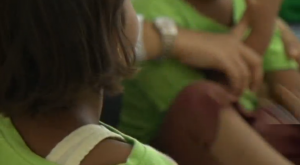(Reuters) — Authorities in the sprawling Indonesian capital are cracking down on child exploitation after a raft of cases ranging from child labour, sexual assault, and violence came to light in recent weeks, officials said.

Tens of thousands of children are trafficked annually in Indonesia, with the majority of them forced into prostitution and manual labor, according to UNICEF.
A wave of arrests late last month included several Jakarta residents who sedated infants and used them to beg for money or hired them out to motorists looking to get around traffic rules.
The city government this week suspended a rule requiring each car to carry at least three passengers, arguing that it was giving rise to child exploitation.
The practice of hiring extra passengers – or “jockeys” off the street to get around the rule has long been in use on the congested streets of the capital. But the discovery of drugged babies has prompted authorities to suspend the rule.
This has in turn caused many jockeys to complain that their livelihoods are in danger.
“I’m frustrated, this is my own child, not a rented child. A mistake of one person has affected others,” said jockey Anis Rani who was carrying her daughter as she gestured to the cars approaching central Jakarta.
A jockey could earn up to $2 in every trip and they can usually make about six trips during morning and evening peak hours. It is a significant amount for low income families in the country, where half of its 250 million population live below $2 a day.
Jakarta police spokesman, Mohammad Iqbal said the new measures will not completely eradicate child exploitation.
“Yes at least there will be fewer (jockeys) on the road because there’s no market for them, because without the three-passengers-in-a-car rule, they have to find other jobs to do. But exploitation of children will not stop there and there could be other forms of exploitation. Therefore it is important that all affected parties should ‘wake up’,” he said.
Authorities have started designating safe houses for vulnerable children throughout the city and patroling neighbourhoods with a high number of children, Iqbal added.
At a state-run rehabilitation centre in east Jakarta, abused children and juvenile delinquents from the age of 3 months to 15 years old participate in academic, sport, and musical activities.
“One of our psychological and social therapies for children is to help them to socialize, (to go) back to school, play with their friends again and also performing prayers to get rid of stress. Many children victims who come to us went through trauma and are in a stressed condition, so we have to heal them so they can return to normal,” said director Neneng Heryani.
There are only 11 centre like that across Indonesia, according to data from Social Affairs Ministry.
While experts welcome the latest efforts to combat child abuse, they say the government still lacks a comprehensive approach.
“So now we are just like fire-fighters, that’s because the system of child protection in Indonesia is not properly managed. So when there’s a case of child abuse it has to be resolved with a comprehensive solution instead of reacting to it, therefore we need to fix it and have a better management system. Secondly, we need to have a database system, currently there isn’t a lot of recorded data,” said Arist Merdeka Sirait, chief of the National Commission for Children Protection.
Data showed cases of children trafficking in Indonesia spiked from 1000 to 6000 cases between 2010 to 2015, added Sirait.







